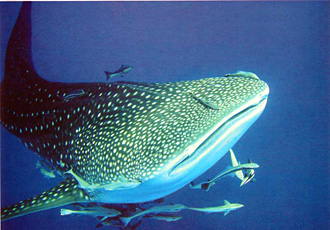 |
 |
 |
 Editorials | Environmental | August 2007 Editorials | Environmental | August 2007  
Researchers Find Largest Whale Sharks Gathering off Mexico Coast
 Associated Press Associated Press
go to original


| | A study released Thursday shows anywhere from 500 to 1,500 whale sharks feeding in the plankton-rich waters off Cabo Catoch.e |
Researchers at the world's largest aquarium have found what is believed to be the world's largest gathering of the world's largest fish along the Mexican coast.

A study released Thursday by the Georgia Aquarium and Mote Marine Laboratory in Sarasota, Fla., shows anywhere from 500 to 1,500 whale sharks feeding in the plankton-rich waters off Cabo Catoche between Mexico's Isla Holbox and Isla Contoy during the summer months. The researchers will travel to Mexico over the next two months to continue studying the animals' behavior.

They have been working with Mexico's National Commission on Protected Natural Areas since 2003 to tag the enigmatic fish and record their mating, eating and swimming habits. One whale shark traveled 550 miles in 31 days, and another dove 4,514 feet into the ocean, the study shows.

The Georgia Aquarium is the only facility outside Asia to display the massive fish, which can be 40 feet long and weigh thousands of pounds. Two of the aquarium's whale sharks - Ralph and Norton - have died unexpectedly since January.

Ralph died first of peritonitis, an infection in his abdomen. Norton was euthanized in June after he settled to the bottom of the aquarium's centerpiece 6 million-gallon Ocean Voyager tank with weak vital signs.

He suffered the same symptoms that Ralph did - erratic swimming and loss of appetite - but aquarium officials are still unsure what caused his illness. Researchers have linked Ralph's loss of appetite to a chemical used in 2006 to clean the sharks' tank.

Mote Marine Laboratory, founded in 1955, is one of the largest independent nonprofit marine research facilities in the world. | 
 | |
 |



